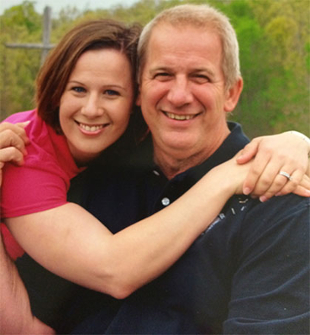A heart for Dad and nursing
Health and Behavior
For a young engineering student used to problem solving, her father’s sudden illness was as mysterious for its unknown origin as it was in the sense of frustration it revealed in Lisa Carnago.
In that dark time in 2003 Carnago was a freshman at North Carolina State University when the call came that her father, a carpenter who routinely worked 60-hour weeks, was inexplicably hit with severe pain that made work nearly impossible.
“My dad is the kind of person you want to help,” Carnago said. “He’s always been a hard worker – that’s just how our family was raised. Dad has always been an inspiration, much more than a hero. It was frustrating for me not to know how to help him.”
Carnago left her studies to help her father, who eventually responded to therapies used to treat rheumatoid arthritis, and felt a calling to the nursing profession. Switching her major and schools, Carnago graduated from East Carolina University in 2007 with a B.S. in nursing.
As a registered nurse, Carnago worked at hospitals and medical centers in North Carolina, Pennsylvania and Virginia before enrolling in 2014 in JMU’s family nurse practitioner M.S.N. program. She anticipates completing the master’s work in May 2016 and has already been accepted into the university’s doctorate of nursing practice program.
Engineering’s loss has been nursing’s gain as Carnago has drawn from her father’s experience in treating a chronic illness and committed to advocating for patients. She presented a paper, “Economic Aspects of Biologic Therapy and Adherence,” at The Graduate School’s first Showcase of Graduate Scholarship and Creative Activity in April.
“This is an integrative project that means something to me,” Carnago said as she told the audience about her father’s struggles to find effective therapies to treat RA. In his case, biologics have proven most useful. Biologic medications are created using human or animal proteins rather than being chemically synthesized as are conventional pharmaceutical products. “They are not first-line drugs of choice,” Carnago said. “Biologics are used when traditional therapies fail,” often for chronic, inflammatory illnesses such as RA, Crohn’s disease, ulcerative colitis, psoriasis and psoriatic arthritis.
The high costs of biologics can make it difficult for patients to adhere to their treatments, as Carnago’s research confirmed. Her review included findings of adherence ranges from 32 percent to 91 percent among RA patients, based on research by M.A. Blum, D. Koo and J.A. Doshi in 2011.
Non-adherence to biologic therapies has personal and societal costs, according to Carnago’s paper. Not only does patient benefit decrease, but failure to adhere to treatment plans stresses health care resources by increasing disability, disease-related surgery and joint replacements.
Adherence research can apply to any therapies, not just the use of biologics. Carnago’s experience as a JMU graduate students bears this out. During her FNP clinical experience, Carnago worked with a patient to help him understand the importance of taking his medications as prescribed for various health conditions.
“We met weekly to focus on one prescription at a time, and by the end of the semester, he was diligent about taking all his medications,” she said. “He understood why he needed to take his meds as directed by his doctor because we developed a trusting relationship over the course of my clinical.”
Combining her nursing experience with her newer role in advocacy has been a gradual melding encouraged by her JMU nursing professors, especially Drs. Patty Hale and Linda Hulton. They supported Carnago in her successful application for the Virginia Nurse Advocate Health Policy Fellowship in 2014 and encouraged her to consider JMU’s doctoral program. The fellowship is designed to provide graduate nursing students “with an inside look into Virginia government, both in policy formulation and execution as well as the politics inherent in both.” The fellowship is associated with the JMU Health Policy Collaborative, which was developed by the Department of Nursing in collaboration with the Department of Health Sciences and the Department of Economics.
“I wasn’t thinking about these ideas when I came to JMU,” Carnago said. “My nursing teachers encouraged me to consider the opportunities here. JMU nursing professors are tops.”
“I don’t know what I’m going to be ‘when I grow up,’” Carnago said. “You can’t predict while you’re still in school what opportunities will be available when you graduate.”
Plus, in her young life, she has taken and followed paths that seemed obvious, in hindsight, from challenges and opportunities as they have come her way.
“I envision continuing to be an advocate for patients and other nurses because there is much room and an increasing need for a voice for these groups,” Carnago said. “Most people don't go into nursing to be policymakers.”
# # #

